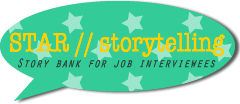
Table of Contents
“Tell me about a time when…” or “Give me an example where…” are the fateful questions the interviewer will ask you to find the recurring pattern of thoughts or behaviours you have productively applied in your past roles to achieve results for your employers.
It’s there where your stories need to come in. The STAR (Situation, Task/Problem, Action, Result) technique is one the most used format to frame your stories.
That’s easier said than done: you need a mix of introspection, storytelling and communication skills. It’s fine to collect your thoughts about your past achievements, look for effective storytelling methods and practice your stories.
But how do you actually learn to build your stories?
You have many traditional ways to help yourself. You can either hire a coach, join a Toastmaster gig, read a Q&A career book, subscribe to podcasts, take a career prep class or even learn from a film director.
Okay, but how to choose the best learning tool?
This is not a one-size-fits-all choice as people differ in the way they are able to learn and also to invest time and money.
However, let’s suppose you are taking a rational decision. You may want to look at something that possibly would be the best balance of the following:
- Effective (i.e., reach the goal you want)
- Simple (i.e., easy to understand)
- Fast to digest (i.e., learning happens quickly)
- Relatively cheap (i.e., costing you little money)
- Speaks your industry language (i.e., related to your sector field)
The learning options above would force you to reach a compromise and pick just some of these features.
So what?
There is another learning option that covers all five features at once: learning from real-world examples.
Learning-by-example has a very long tradition. The following quote of Seneca, one of the most influential writers and orators of ancient Rome, says it all.
“The path of precept is long, that of example short and effectual.”
Seneca (c. 4 BC – A.D. 65)
So, what’s the learning option then?
Here is a simple recipe to create your stories fast while staying relevant.
1. Job Description: Bring out from The specs what’s Sought By Your Employer

2. CV/Résumé: Find All Skills That Match

3. Story Napkin: Download a free template & Draft Relevant Examples

4. StarStorytelling.com Stories: Get inspired by Your Industry Peers and improve your Stories

Rehearse, rehearse, rehearse. Good Luck!
Want to earn from your stories? Upload and sell them here.
Help us to spread the voice and share this post. Thank you.
